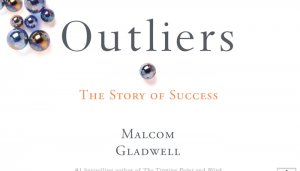Malcolm Gladwell’s most recent book, The Outliers, is a thought-provoking read. In it, the author examines the formative years of people whose successes so far outstrips the norm they are considered statistical “outliers.”
In America, we say these people are self-made men (and he examines men almost exclusively) who worked hard and pulled themselves up by their bootstraps. But the conclusion Gladwell draws after delving into the cultures, socioeconomic status, educational opportunities, family structures, birth dates, and amount of time spent practicing craft, is quite different. His claim, which he backs up with convincing anecdotal and statistical evidence, is that highly successful people are a product of a combination of favorable factors, along with the incredible good fortune to be born in the right place at the right time.
Much of what he said is already accepted fact in educational circles, and as a former teacher, his premise didn’t surprise me. My ah-ha moment came when I replaced his continual use of words like luck, lucky, and good fortune with the word “grace” and realized that his entire book, whether he meant it to be or not, was an treatise about undeserved, unexpected, unwarranted grace. Using the book as a lens, Gladwell helped me recognize the many manifestations of God’s grace in my life, and I saw how crucial it is to offer grace to others.
Maybe you’ll come to the same conclusion when you read the book. Maybe not. But you should give it a read. No matter what conclusion you arrive at, the book will definitely make you think.


